

 Vol. 39 (Number 30) Year 2018. Page 22
Vol. 39 (Number 30) Year 2018. Page 22
Marina Mikhailovna SHALASHOVA 1; Natalia Ivanovna SHEVCHENKO 2; Dmitry Aleksandrovich MAHOTIN 3
Received: 15/03/2018 • Approved: 30/04/2018
ABSTRACT: The article considers the issues of teachers’ development and training and ways of increasing their and their students’ functional literacy that is seen as an indicator of mastering the competencies required in education. The authors explore methods of develop teachers and students’ ability to conduct joint search for solutions to current problems and meet modern challenges in real life situations, which determines practical and theoretical significance of the research. |
RESUMEN: El artículo considera los problemas del desarrollo y la capacitación de los docentes y las formas de aumentar su alfabetización funcional y la de sus alumnos, lo que se considera un indicador del dominio de las competencias requeridas en la educación. Los autores exploran métodos para desarrollar la capacidad de los docentes y de los estudiantes para buscar conjuntamente soluciones a problemas actuales y enfrentar desafíos modernos en situaciones de la vida real, lo que determina la importancia práctica y teórica de la investigación. |
All over the world, modern general education aims to develop students’ personality, ensure learning outcomes required for their socialization, professional and personal self-defining, and readiness to continue education. Therefore, it is necessary to change existing educational practice, shifting its focus from the reproduction of knowledge to the independent search and use of modern technologies and tools, including ICT which give the experience of effective thinking and productive activities.
The relevance of the article is determined by the fact that it considers changes in the methods of teacher training and increasing their qualifications so that they can master tools necessary to develop students’ functional literacy. Researchers believe this problem can be solved by changing techniques and thus achieving qualitatively new learning outcomes of school and university students. At the same time, we believe that a more in-depth analysis is needed which would allow considering teachers’ understanding of functional literacy, their knowledge of the tools required to solve this problem, and practical training of modern teachers so that they receive a new insight into the quality of education. The article aims to study the development of functional literacy of school and university students, changes in teaching methods and ways of improving skills of a modern teacher in a comprehensive school and teaching staff at a pedagogical university. The main methods used in the article are theoretical methods. In the course of the research it was revealed that teachers do not have a sufficiently high level of pedagogical skills and competencies required for forming students’ functional literacy. The article considers optimal conditions necessary for the development of functional literacy. The authors show that it is necessary to change the content of the teacher training program and the advanced teacher training programs. The research findings include a complex of conditions for the development of functional literacy of school and university students, including the need for changes in the training and professional development of teachers.
In the age of the global infosphere, massive use of gadgets, educational system is forced to accelerate its transformation and better adapt to new social requirements. Many countries, including Russia, have faced the problem of functional illiteracy in the context of the development of the global information society.
Analyzing the content and quality of school students’ training, leading experts note that it is necessary to obtain such leaning outcomes that will allow modern school-leavers to become successful in their life and job. The research findings confirm that at present it is crucial for a student to be able to navigate in the flow of information, to find right solutions for emerging problems and situations, whereas the volume of knowledge does not matter so much. Modern school and university students need soft skills which determine a person’s ability to work in a team and are related to their thinking flexibility, mobility and efficiency in making decisions. The conducted research proved that currently the quality of learning outcomes of school and university students is assessed on the basis of their functional literacy. However, until recently, the concept of “functional literacy” has not been considered in detail in Russian education.
Therefore, there is a contradiction which is determined by the fact that by inertia, teaching is mostly carried out within traditional paradigm and is based on the explanatory-illustrative method of presenting new information by the teacher. This method means that learners should reproduce what they have heard (read), which activates their visual thinking at the expense of the logical and abstract one. The conducted research shows that the learning process, designed within this method, does not create conditions for the development of functional literacy of school and university students and hinders their general development. In the course of the research, it became obvious that this problem is not limited to pedagogy, but is also linked with the quality of teacher training, children training in primary school and further. Thus, these drawbacks in the training of school and university students should be dealt by training school teachers and staff of pedagogical universities.
In this research, the authors investigated the issue of training teachers to develop functional literacy of school and university students. The paper explores teachers’ understanding of the essence of functional literacy, ways of its development, approaches to defining criteria for its objective and subjective measurement, as well as assessing the professional competence teachers have in this field. It should be noted that the article deals with the development and not the formation of functional literacy since in high school and university learners already have certain experience of intellectual and practical activities required for mastering the curricula.
From the perspective of cultural constants, functional literacy is a way of social orientation of the individual which links education (first of all, general one) and diverse human activities. This feature of functional literacy manifests itself in its purpose, that is solving vital tasks in various activities by using applicative knowledge that everyone needs in the rapidly changing society [Vershlovsky, Matyushkina, 2007]. In this context, functional literacy is not a condition, but rather a factor that influences people’s participation in social, cultural, political and economic activities, as well as lifelong learning. Proceeding from this, functional literacy in its global sense is an indicator of social well-being, certain social and cultural achievements of the society [Rudik, Zhaytapova, Stog, 2014]. A low level of functional literacy should be regarded as a risk of social crisis in the country.
The novelty of the research is determined by applying an integrated approach to studying the condition and ways of developing functional literacy of teachers and students at schools and pedagogical universities. The authors described distinctive features and pedagogical conditions required for the development of functional literacy of school and university students.
Therefore, ignoring the issue of functional literacy in school and university education can be seen as a factor undermining instability and disintegrating the society, which means this gap in teachers’ training is fairly significant.
Functional literacy was first considered as an international problem relevant for developed countries by UNESCO in 1965, in Tehran, where the term was proposed. According to this document, “a functionally literate individual is the one who can participate in all kinds of activities in which literacy is required for the effective functioning of their group and which also enable them to further use reading, writing and numeracy for their own development and for the development of the society” [Chigisheva, Soltovets, Bondarenko, 2017]. In the late 1960s, the concept of “functional literacy” (illiteracy) emerged in pedagogy. Modern civilization has developed a different understanding and content of literacy and education.
Over the recent years, the issues related to the development of functional literacy of students have been explored by many Russian and international scientists. For instance, V.V. Gavrilyuk, G.G. Sorokin, Sh.F. Farakhutdinov [2009] consider functional literacy as part of the culture of the information society; at the same time, A.A. Kontrimovich, M.V. Payunena [2011] believe that knowledge of foreign languages influences the mastery of functional literacy. Researchers consider the issue of functional literacy in terms of its importance for achieving learning outcomes in various fields, improving the quality of reading and writing, personal development and staff training [Lebedev, 2003]. However, this issue has not been thoroughly studied regarding school and university students.
Having analyzed publications, the authors could identify that the structure of functional literacy includes (Lebedev, 2003):
- cognitive base, which represents the whole of objective, interdisciplinary, integrative knowledge and skills that enable the understanding and application of certain rules, norms and instructions;
- educational domain, which represents the set of information sources about the essence of functional problems and the ways to solve them that a learner should master;
- methods for solving functional problems which learners actively apply.
At the same time, O.E. Lebedev notes that learners’ awareness of the importance of the problem being solved is a component that underlies the structure of functional literacy.
The experience of modern educational practice and scientific research show that in the structure of functional literacy the main component is the personal awareness of the importance of the problem being solved for a student. At present time, researchers again turn to the idea that the learning process takes place within the learner’s individual activity, and that the student can form and develop specific types of activity, as well as certain mental abilities, skills and actions only by mastering certain activity types [Vygotsky, 2005].
Thus, the learning process does not immediately develop a person by itself, but only if it contains tasks stimulating students’ activity and appropriate content, so that it facilitates the formation of certain types of activities at a certain age (in pre-school age, for example, playing, in primary school – learning). Hence, as L.S. Vygotsky believed, the individual’s activity is always between one’s mental development and learning. In this regard, P.P. Blonsky [1935], as well as L.S. Vygotsky, noted that it is necessary to select appropriate content and scientific knowledge, saying that “the empty head does not reason”. Knowledge and experience of a person emerge and reveal themselves in activity. This opinion resulted in the creation of appropriate pedagogical conditions for independent cognitive activity of students, the mass introduction of problem-based learning and project methods, group and team work in the classroom, and the use of electronic educational resources and technology.
Approaches to the literacy formation, theoretical and practical aspects of its scope and essence have been researched by international scientists over several decades [Street, 2013; Hamilton, Burgess, 2013]. UNESCO’s International Education for All Program stated the crucial importance of functional literacy [UNESCO, 2015].
The great significance of developing scientific literacy and critical thinking in primary education is also reflected in research papers [Vieira, Tenreiro-Vieira, 2016]. It has been found that to teach reading for meaning to schoolchildren the teacher should master some new methods [Patterson, Roman, et. al 2018]. Despite their popularity, modern technical means do not ensure the development of necessary skills and actions of functional literacy, including writing text messages [Zebroff, Kaufman, 2017]. However, the issue of the influence of digital technologies on the development of students’ literacy is still of great interest [Sofkova Hashemi, Cederlund, 2017; Hallam, Thomas, Beach, 2018].
Comparative analysis of the findings of TIMSS and PISA international studies on the quality of general education allows us to identify the main problems that are typical for the Russian general school education. TIMSS assesses the quality of mathematical and natural science education at the levels of primary, secondary and high education (grades 4, 8 and 11). PISA studies assess the functional literacy of 15-year-old schoolchildren in mathematics, reading and natural science. Analysis of the results of TIMSS studies showed that in mathematical and natural science education (1995, 1999, 2003, 2007 and 2011), fourth- and eighth-graders demonstrated results above the international average. Russian students are slightly behind their peers in other developed countries regarding general education. In this study, the leading positions were taken by students from Japan, South Korea, and Singapore.
TIMSS indicators show relatively high learning outcomes of Russian students, while PISA (Program for International Student Assesment) proves the contrary.
In comparison with the previous measurement (2011), it was mostly fourth-graders who showed higher results (there were practically no changes for eighth graders, and in some cases they got an even lower one). Fourth graders improved their score in mathematics by 21 points, and in natural science – by 15 points (using a 1,000-point scale). Significant differences of these two studies are explained by different research methodologies. For instance, TIMSS tests mastery of basic knowledge and skills, mainly at the level of reproduction and application according to the model, which is typical of Russian school. PISA tasks test the ability to apply mastered subject knowledge and learning skills in a new situation, to identify new information in the given content, to understand and analyze it.
However, all this should be taught by teachers, and the requirements to their professionalism have dramatically increased. This is reflected in the professional standard of the teacher and is based on the concept of a competence. New standards are being developed for teacher training; however, many university educators have inaccurate ideas about the ways of developing new professional activities (competences) teachers need, including those related to functional literacy.
This research was conducted and its findings were implemented at Moscow City Teachers’ Training University and Moscow schools. Moscow City Teachers’ Training University adopted the programs aimed at improving teachers’ skills and based on the corporate training model (2016-2018). This model involves training teams of teachers working in the same grade in one school. In the course of the program implementation, scientific and theoretical support is provided by a team of university teachers who at the same time develop and study it, gaining new experience. The experiment showed that the formation/development of functional literacy should be carried out in a team and in accordance with unified requirements.
The main idea of this research is to emphasize teachers’ ability to develop functional literacy which is seen as the main indicator of their professional competence and educational work in general. The idea became the core in the hypothesis of the study. This allowed the authors to outline the problem of the research: what conditions are necessary for the development of functional literacy of school and university students in the learning process?
Proceeding from this, the goal of our research is: to identify and provide theoretical justification for the set of pedagogical conditions aimed at the development of functional literacy of school and university students.
The hypothesis is as follows: teachers have a sufficient focus on developing subject and meta-subject skills and activities of school and university students, but they do not consider them as integral components of a qualitatively new learning outcome – the learner’s functional literacy, whereas learning should be designed in collaboration to achieve this quality characteristic and a relevant set of conditions should be devised for this purpose.
Objectives of the study:
1. To analyze the leading approach to education in Russian and pan-European contexts.
2. To identify the essence and features of the concept of “functional literacy”.
3. To survey teachers to assess their ability to develop functional literacy of students.
4. To determine a set of pedagogical conditions that facilitate the formation of functional literacy of school and university students.
Taking into account the research objectives, the respondents were asked to define functional literacy. This question had four possible answer options. Most respondents defined it as “the ability of a person to interact with the external environment and to adapt as quickly as possible and to function in it” (53%). Another 26% chose the naswer “the cultural norm that determines the link between education and different types of human activity, while the answer “the level of knowledge and skills minimally required for the person’s life” was chosen by almost the same number of respondents as the previous one. The smallest percentage of respondents (11%) defined functional literacy as “the degree of person’s readiness to perform the professional functions assigned to them”.
Fig. 1
Respondents understanding of
the essence of functional literacy.
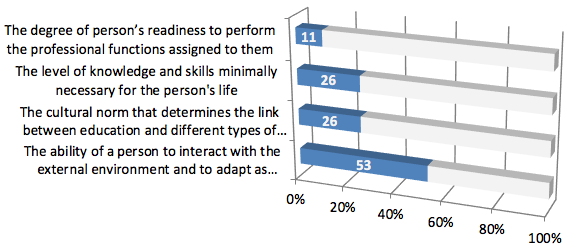
The analysis shows that most respondents view this phenomenon as applicative knowledge that is used when it is necessary. Currently, global education practice sees it primarily as a cultural norm.
When asked when schoolchildren reach the level of functional literacy, 48% of respondents said that it does not occur at school. At the same time, 24% answered they reach this level by the end of primary school, when finishing high school – 12%, respectively. Another 6% believed that the level of functional literacy is achieved when children finish primary school.
Fig. 2
Respondents’ view on the levels
of achieving functional literacy.
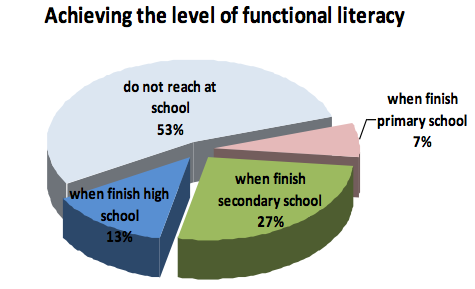
Analysis of the answers shows that teaching staff at school is not ready to jointly design the learning process with the purpose of forming functional literacy of schoolchildren. From our point of view, this study should become a starting point for changing the practices adopted by educators, while this task should become a priority in the work of such teachers’ teams and imply delegating responsibilities.
The question, “what changes do you think should take place in school to form functional literacy of students?” was supplemented with various answers (10): to stimulate students to solve practical problems; to increase the share of project, research and creative assignments; to introduce more tasks for group and team work; to introduce new (non-traditional) tasks (observations, research, exploration, writing poems, etc.); to facilitate the development of self-study skills; to facilitate the development of analytical abilities and operating large volumes of research information and data; to receive individual feedback from each student; to create conditions for self-evaluation and peer evaluation; to design individual learning routes; to create conditions for acquiring the experience of real (socially oriented) activities.
Of all proposed options, the most popular were, respectively: to create conditions for acquiring the experience of real (socially-oriented) activities (77.8%); to stimulate students to solve practical problems (70.4); to facilitate the development of self-study skills (44.4%); to facilitate the development of analytical abilities and operating large volumes of research information and data (44.4%); to increase the share of project, research and creative assignments (37%); to introduce more tasks for group and team work (37%). The least chosen answers were: to receive individual feedback from each student (11.1%) and to design individual learning routes (14.8%).
Fig. 3
Ways of forming and developing functional
literacy in the learning process
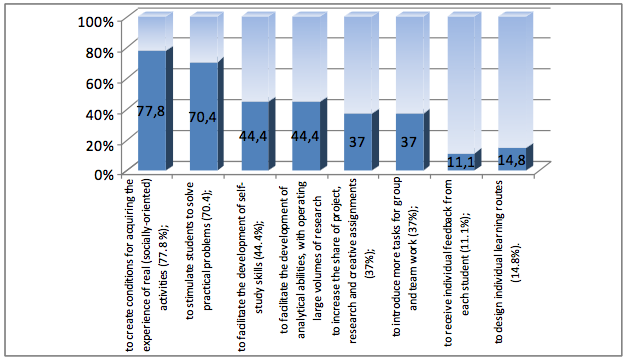
Answers to this question describe the understanding of the ways of forming and developing functional literacy in school’s learning process. However, this contradicts the answers to the first question about the essence of the students’ level of preparation.
Being asked what changes should take place in the training of would-be teachers to form their functional literacy, the respondents were offered eight answer options. Answers “the focus on the formation of general (personal, meta-subject) competencies in the course of professional training” and “changes in the organization of internship and on-the-job training” scored equally high (55.5%). Other popular answers were: “introduction of new elective courses to develop students’ functional literacy” and “using forms, methods, technologies of informal education (clubs, meetings, social networks, etc.)” (37%). Few respondents chose other answers. These choices indicate that teachers realize the importance of extracurricular forms of education and additional education in solving problems of personal development and functional literacy, while they are not inclined to change the methodology of traditional class-lesson teaching itself. However, this would imply moving to the paradigm of active education which focuses not on knowledge, but methods of operating this knowledge, as well as gaining the experience of project or research activities that develop skills required for independent search of necessary information.
Fig. 4
Changes that should take place in the training of
would-be teachers to form their functional literacy.
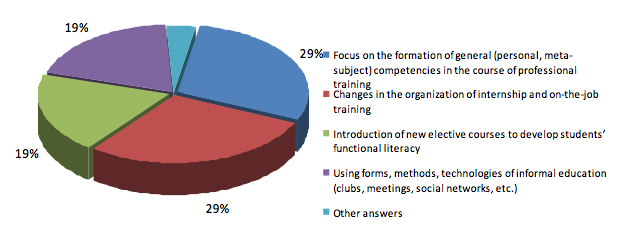
Analyzing the answers of the respondents, it is necessary to note that they imply the need to change the educational process, which, of course, denotes the positive prospects regarding the preparation of would-be teachers and the changing situation in school.
The question “which of the skills of the 21st century, in your opinion, are linked to the functional literacy of the individual?” had eight answer options. The respondents mostly chose such answers as: critical thinking and analytical skills (66.7%); communicative skills (63%) and systems thinking (59.3%); team work (48.1%). At the same time, adaptability, cooperation, initiative and project skills made up from 44.4% to 33.3% of the respondents’ answers.
Fig. 5
Skills of the 21st century which correlate with
the functional literacy of the individual.
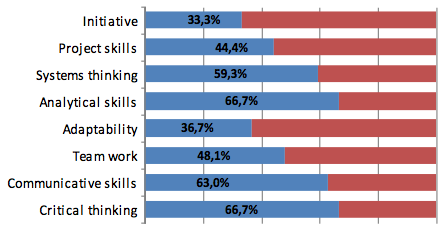
The analysis of the answers clearly reflects the demand for certain personal qualities in the labor market which also represent the constituent components of functional literacy. At the same time, it should be pointed out that such indicators as critical thinking, analytical abilities and systems thinking are closely related and should be continuously developed throughout life, while communicative and teamwork skills are in extremely high demand today.
When asked to state their position when filling in the questionnaire, 53% of the respondents defined themselves as university teachers, 14.8% – heads of educational organizations, 11.2% – researchers. Some answers included a teacher and a deputy headmaster. Answering the question “what is your teaching experience?”, the majority said it was 15 years, the next popular answer was 7 years, and the smallest number chose 3 years.
Fig. 6
The respondents’ experience
of teaching (years).
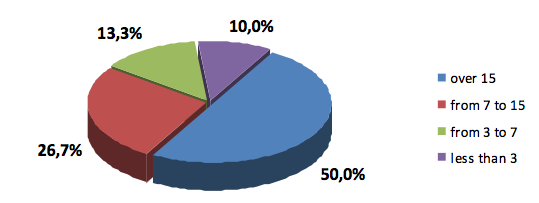
Analyzing the composition of the respondents, we would like to note their professional maturity, high potential and a positive attitude toward changes in the education system which have become a steady trend in the last quarter of the century.
Eleventh graders and third-year students were asked to evaluate the educational content, teaching methods and educational environment regarding how well all of these ensure the development of functional literacy, from 1 to 3 points.
Fig. 7
Evaluation of educational content regarding
the development of functional literacy.
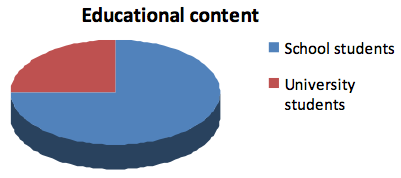
-----
Fig. 8
Evaluation of teaching methods regarding
the development of functional literacy.
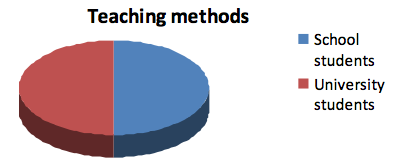
-----
Fig. 9
Evaluation of the educational environment regarding
the development of functional literacy.
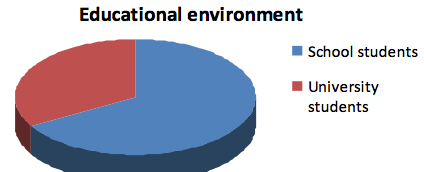
Methods of research. The study was conducted using the following theoretical methods: the analysis of available publications on the topic, comparing its findings with the results obtained during the study. The empirical method (observation, self-observation) included the goal, objectives, subject, scope and educational situations that helped to assess the training of teachers and students both at school and university. The method of interpretation made it possible to use the set of results obtained by analyzing publications on the topic researched as well as conducted studies to obtain a holistic picture of functional literacy in school and university. Filling in questionnaires, the respondents could give their own answer at a convenient time; the questionnaires were distributed among teachers at schools and teacher training universities and explored their understanding of the essence of functional literacy and the ways of forming it. In addition to this, the study aimed to study how teachers understand the essence of functional literacy and other learning outcomes and how well they know the mechanisms and tools to develop these in students. The survey involved 68 school and university teachers from 8 regions and 15 Russian universities. It consisted of seven multiple choice questions.
The authors studied school and university environments where school students and their would-be teachers are trained. This made it possible to identify a set of conditions necessary for the development of functional literacy of students, to find similarities and differences in the work of university and school students and teachers.
Having analyzed the questionnaire data, the authors identified the inconsistency in the views of teachers at pedagogical universities regarding the nature and ways of forming functional literacy of students and schoolchildren.
Most respondents note poor conditions for the formation of functional literacy at all levels of general education, which refers to university and school teachers, high school students, and university students. The results showed that university and school teachers understand that student teaching and community-based internships will be the most effective regarding the formation of functional literacy of schoolchildren and university students. Unfortunately, the teachers did not consider it important to develop student’s personality, although it is what ensures successful socialization in modern society.
The findings of the questionnaire conducted among eleventh graders and third-year students confirmed the idea that functional literacy is formed only when the individual is engaged in an activity that has personal significance to them and that can be either purposeful or spontaneous, but always driven by personal motives. This is confirmed by low assessment of teaching methods (1 point each) and educational environment (especially by university students). At the same time, school and university students assessed the educational content differently. The school students considered it more significant and relevant regarding the development of functional literacy, while it was less important for university students. It can be assumed that in this case, university students realize the need for practical-oriented, competency-based educational texts, the number of which is currently insufficient. The eleventh-graders do not realize this yet.
At the same time, the research findings point to the need for changes in general education and teacher training at universities. It is obvious that modern approaches and the corresponding interactive methods that are insufficiently used in modern education, both at school and in a university teacher training course, have an important role in the development of functional literacy. Subject knowledge should be flexible, deep and well-mastered, as this is a prerequisite for the formation of the functional literacy of learners as the integral characteristic of their personality, their ability to take a public stance in a certain activity and science. At present, functional literacy is the first step for successful self-realization in society.
Specific features of functional literacy:
– focus on solving social and everyday problems;
– situational characteristics of the personality which reveal themselves in certain social circumstances;
– a link to solving standard, typical tasks;
– mastery of a certain elementary (basic) level of reading and writing skills;
– is primarily used to assess adults;
– is relevant mainly in the context of finding efficient ways to increase literacy.
Within the system of training and career development of school and university teachers, the following conditions should be created:
– an integrated approach to teachers training aimed at preparing them to develop functional literacy of students;
– mastery of subject content, modern teaching methods and techniques;
– teaching methods and techniques are applied in accordance with the goal;
– conducting students’ research projects;
– taking into account individual needs, interests and aptitudes of students;
– organizing the work of the teams of teachers under the supervision of their organization, professional associations and unions;
– facilitating the use of digital resources in education and information systems to assess the development of each student;
– design, planning and management of the educational environment in cooperation with other teachers and partners;
– after action review and making necessary adjustments.
Thus, functional literacy is a meta-subjective, integral phenomenon that is formed in the course of studying school subjects with focus on personal features and that is manifested in various forms.
Having examined the questionnaires of teachers and students at school and university, the authors could describe the current state of functional literacy in school and teacher training university and ways of its development. According to the conducted research and the findings obtained, it can be stated that the educational content at school should include problem situations (cases), interactive methods (technologies) that enable efficient mastery of the material and the development of communicative learning skills. This will enable to reach the expected result, as long as there are changes in teacher training and their qualification is increased. Along with this, it is viable to include courses (modules) on innovative practices, teaching methods and techniques in the educational programs of teacher training. Special work should be carried out with students and teachers, and advanced training programs should be introduced. These should focus on developing and testing tools that would allow achieving new educational outcomes, taking into account the experience of international studies such as PISA (Program for International Student Assessment) and TIMSS. Practices of teaching school teachers teams should include situations related to solving relevant pedagogical problems, including the use of technologies for the development of functional literacy of students. During training, teachers should think over and discuss the continuity of the content and stages of the development of various components that make up functional literacy.
It is important to increase the number of student internships, classes whose goal is to design the learning process and create a valid toolkit that will ensure the achievement of new learning outcomes.
From our point of view, the crucial among the considered conditions is the need to train school teams of teachers to develop certain competencies. This practice has been implemented since 2013 in the Moscow City Teachers’ Training University as the main form of advanced teachers training. Over the period from 2015 to 2017, the total of 1,020 educators from 43 Moscow schools [Shalashova, Shevchenko, Makhotin, 2017] have upgraded their qualifications within this program. This form of training teachers becomes more and more demanded among heads of educational organizations who see it as an effective tool for the development of functional literacy of both teachers and students [Shalashova, Shevchenko, 2015, 2016].
The curriculum at the Moscow State Teachers’ Training University is constantly updated, with its modules and courses aimed at studying modern teaching practices. It is possible to conduct student teaching in the best schools of the metropolis, as well as to build individual learning routes, get familiar with new approaches and trends in education while studying at university; student teaching and end-of-course assessment are also being updated.
In this study, to solve the research problem posed, the authors identified the conditions of the learning process required for the development of functional literacy of school and university students.
The findings of the conducted research prove the need for an integrated approach to studying the problem of the development of functional literacy of teachers and students at schools and pedagogical universities and providing the set of conditions identified in this paper.
Adopting the ideas of L.S. Vygotsky [2005], O.E. Lebedev [2003], O.P. Chigisheva [2017] and others, the study proves that the main aspect of the development of functional literacy is the awareness of the significance of the problem being solved for the individual himself.
The theoretical and practical contribution of the authors to the solution of the problem considered in this article is the following. The study identifies the conditions for the development of functional literacy of school and university students, which would allow increasing the quality of teachers’ training of teachers and improving their skills. The authors hope that the presented materials will be applied in other studies to find new solutions. The problems examined can become the starting point for the reflection of all other parties concerned about the learning process, as well as those who are searching for ways to improve the image of the Russian and European school and education forms. The improvements noted by us can be used not only in theoretical papers, but also can also be introduced into educational programs at school, additional vocational training, and teacher training. However, the scope of the article does not allow the authors to provide the comprehensive coverage of the detailed findings of the studies conducted.
Blonsky, P.P. (1935). Memory and Thinking. Moscow, 149, 157. Available at http://elib.gnpbu.ru/text/blonsky_pamyat-myshlenie_1935/fs,1/
Chigisheva, O.P., Soltovets, E.M., Bondarenko, A.V. (2017). Interpretation specifics of the concept of “functional literacy” in the Russian and European theory of education, Online-journal “The World of Science”, 5(4). Available at http://mir-nauki.com/PDF/45PDMN417.pdf.
Chu, S.L., Quek, F., Deuermeyer, E., Martin, R. (2018). From classroom-making to functional-making: A study in the development of making literacy, ACM International Conference Proceeding Series, ACM International Conference Proceeding Series Part F132090,3. Available at https://www.acm.org/publications/icps-series
Gavrilyuk, V.V., Sorokin, G.G., Farakhutdinov, Sh.F. (2009). Functional Illiteracy in the Context of the Transition to Information Society. Tyumen: Tyumen State Oil and Gas University.
Hallam, G., Thomas, A., Beach, B. (2018). Creating a connected future through information and digital literacy: Strategic directions at the University of Queensland Library, Journal of the Australian Library and Information Association, 67(1), 42-54.
Hamilton, M., Burgess, A. (2013). Back to the future?: Functional literacy and the new skills agenda. Discussion paper. http://eprints.lancs.ac.uk/66608/
Kontrimovich, A.A., Payunena, M.V. (2013). Development of functional literacy: from the experience of teaching a foreign language. Public Education. Pedagogy, 2, 36.
Lebedev, O.E. (2003). Students’ accomplishments as the goal of education and the learning outcome. Quality Control and Assessment in Education: International Conference on Mathematics. St. Petersburg: Publishing House of A.I. Herzen Russian State Pedagogical University, 113-129.
Patterson, A., Roman, D., Friend, M., Osborne, J., Donovan, B. (2018). Reading for meaning: The foundational knowledge every teacher of science should have, International Journal of Science Education, 40(3), 291-307.
Rudik, G.A., Zhaytapova, A.A. (2014). Functional Literacy in Reading: Workbook for Self-study and Reliable Assessment.
Shalashova, M.M., Shevchenko N.I., Mahotin, D.A. (2017). Training Teachers to Implement GSES of General Education: New Models of Teacher Training (Training of School Teams). Мoscow: Moscow State Teachers’ Training University.
Shalashova, M.M., Shevchenko, N.I. (2015). The quality of continuing vocational programs: the search for answers to the challenges of our time, Human Capital, 7(79), 94-98.
Shalashova, M.M., Shevchenko, N.I. (2016). Corporate model of professional development: training school teams of teachers to implement GSES of General Education, Bulletin of the Moscow State Regional University. Pedagogy Series, 2, 179-189.
Sofkova Hashemi, S., Cederlund, K. (2017). Making room for the transformation of literacy instruction in the digital classroom, Journal of Early Childhood Literacy, 17(2), 221-253.
Street, B.V. (2013). Literacy in Theory and Practice: Challenges and Debates over 50 Years Theory into Practice, 52(SUPPL 1), 52-62.
UNESCO, 2015. Education for All: Global Monitoring Report 2015: Achievements and Challenges, Paris: UNESCO. Available at http://unesdoc.unesco.org/images/0023/002322/232205e.pdf.
Vershlovsky, S.G., Matyushkina, M.D. (2007). Functional literacy of school-leavers, Sociological Research, 5, 140-144.
Vieira, R.M., Tenreiro-Vieira, C. (2016). Fostering scientific literacy and critical thinking in elementary science education, International Journal of Science and Mathematics Education, 14 (4), 659-680.
Vygotsky, L.S. (2005). Psychology of Human Development. Moscow: Smysl; Eksmo, 664-1018.
Zebroff, D., Kaufman, D. (2017). Texting, reading, and other daily habits associated with adolescents’ literacy levels, Education and Information Technologies, 22(5), 2197-2216.
1. Doctor of Pedagogical Sciences, Associate Professor. Moscow City Teachers’ Training University
2. Candidate of Pedagogical Sciences, Associate Professor. Moscow City Teachers’ Training University, natalieshevchenko@yandex.ru
3. Candidate of Pedagogical Sciences, Associate Professor, Moscow City Teachers’ Training University